Existing User Log In
New User Registration
Register for a free account to gain full access to the VGChartz Network and join our thriving community.



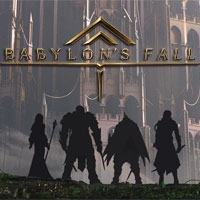

America - Front


America - Back

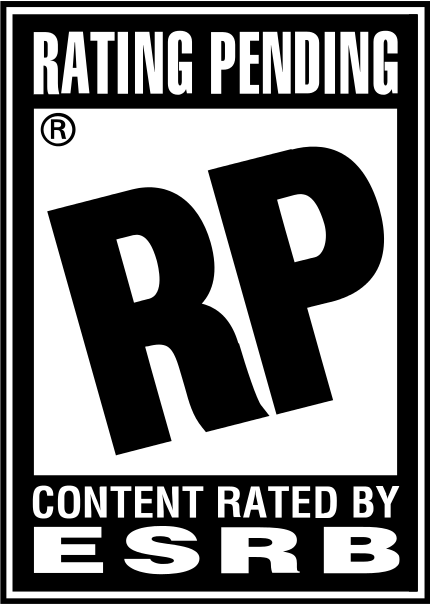
PlatinumGames
Action-Adventure
 03/03/22 Square Enix
03/03/22 Square Enix  (Add Date)
(Add Date) 03/03/22 Square Enix
03/03/22 Square Enix
| Owners: | 0 |
| Favorite: | 0 |
| Tracked: | 0 |
| Wishlist: | 0 |
| Now Playing: | 0 |
I’m all for experimentation in the game industry; it’s how games grow as a medium and how we as consumers often discover new things we didn’t even know we wanted. If you had pitched to me the idea of a Metal Gear title with hack and slash combat a decade ago, I would have been skeptical at best. But, sure enough, Platinum Games took that idea and turned it into one of the most memorable and interesting releases of the past decade. Turn the clock forward almost ten years, and Platinum has now tried its hands at making a multiplayer online RPG with hack and slash combat. And, in doing so, has also provided a very good example of what happens on the opposite extreme of experimentation: you get a really, really bad game.
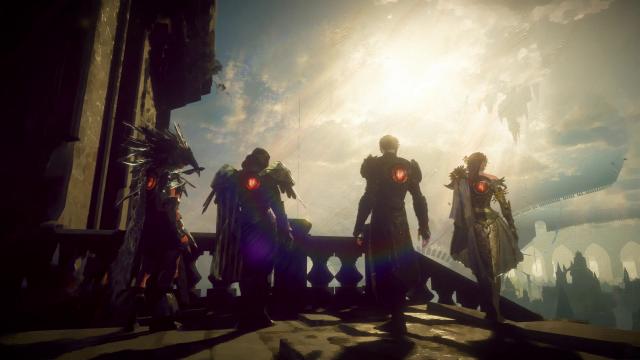
Before we get too deep into dissecting this mess, let’s back up a bit and establish a bit of context. Babylon’s Fall is a crossover between Platinum (who wanted to make a hack and slash title) and Square Enix (who wanted an RPG with online elements). When I heard about this, the word “Scalebound” immediately lit up in my mind like the check engine light in a car; a title that was ultimately undone by the developer wanting to make a style of game that didn't really translate well to the online focused experience desired by the publisher. The only difference between that and Babylon’s Fall is the people at Microsoft had the good sense to cancel Scalebound.
We might as well start with the story, then, or the lack thereof. In a future so distant that Earth has undergone multiple apocalypses, we play as some dude or dudette who starts off as a prisoner of an empire. Our character is forced by the Empire to undergo some sort of energy infusion that kills nearly everyone it’s attempted on. After we survive, thanks to being the main protagonist, the empire sees potential in us and forcibly enlists us as a mixture of security guard, archeologist, and pest control. Most of the game is spent sending us out on various missions to the nearby Ziggeraut, a structure that may or may not contain advanced technology, and... that's about it, really. The rest of Babylon’s Fall is almost exclusively spent hunting for treasure in the Ziggeraut and bringing it back for predominantly undisclosed purposes.
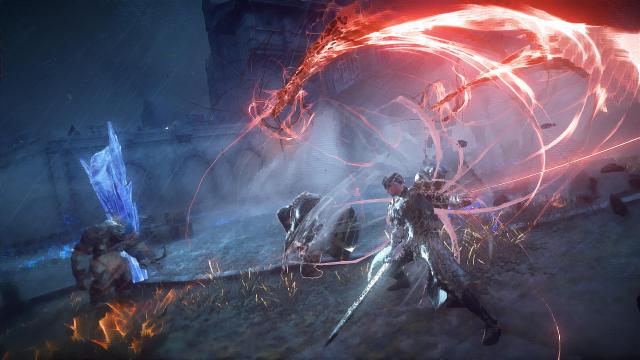
There’s honestly an absurd amount of lore written for this title, most of which is wholly unnecessary and makes the game’s backstory utterly incomprehensible, unless you’re prepared to take a week long expedition to a Wiki somewhere with a team of historians. It details an all powerful energy source discovered by humans in the far future, various empires that rose up and crumbled around that energy, wars that were fought over it, etc. And none of it seems to affect the main plot, or at least certainly didn’t in the time I played it. I wish they had spent all that time they wasted writing the lore on building some engaging characters to interact with instead.
However, the story is really just an excuse for a live service title to justify its gameplay; the proverbial box of mold ridden breadsticks to appetize us for the soggy, room temperature pizza that serves as the main appetizer. And don’t worry, the gameplay is bad for its own reasons. Let’s start with the mission design, which is probably the biggest offender. These sorts of live service, mission-based games usually try to mix up objectives a bit between missions in order to provide some variety. Babylon’s Fall, however, decided that its combat was so engaging that no variety was needed, and as a result basically every mission entails roughly the same thing from a gameplay perspective. Kill 4-5 waves of baddies, take down a boss wave, grab some loot, return to base. Rinse and repeat. No switching up objectives, no “defend this spot” or something like that, just a generic excuse to go out and fight repetitive waves of enemies every time.
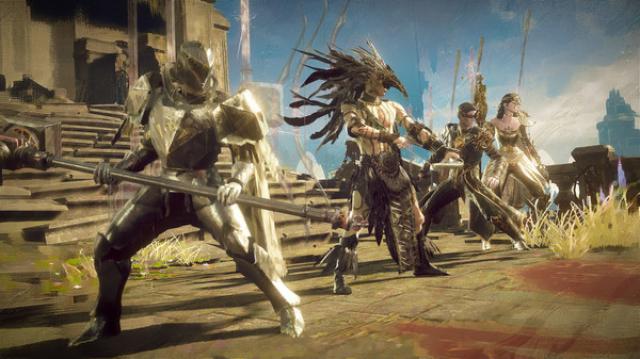
For what it’s worth, the combat is, at its best, not bad. Not good, but… not bad either. There’s actually a decent amount of variety to the combat, between five weapon types, three modes for each, light/strong attacks, the title’s signature “Gideon Arms” gimmick, and a few directional input commands. Throw in Platinum’s now prerequisite perfect dodge mechanic and some team building logistics, and there’s enough complexity to experiment and have some fun with. There are two major caveats to this: the game’s less than stellar job of explaining its mechanics, and the fact that a good chunk of it is withheld until you’ve sunk a large chunk of time into things.
Let’s start with the first. Babylon’s Fall barely gives you any insight into how to use its various mechanics beyond a very simple tutorial mission at the start that covers the absolute bare minimum of how to play the game (jumping, pressing light/strong attack, and so on). And I imagine that’s probably played at least some role in why Babylon’s Fall has reviewed so terribly, because once you have a firmer grasp on what exactly you can do in the combat, there is some fun to be had here. Even if the mission design is incredibly repetitive and the environments look like they just copy/pasted the same Bayonetta-esque Eastern European city architecture 500 times over, there is something to be said for being able to walk into a room and deftly move between powerful foes with a variety of oversized swords, hammers, bows, and more.
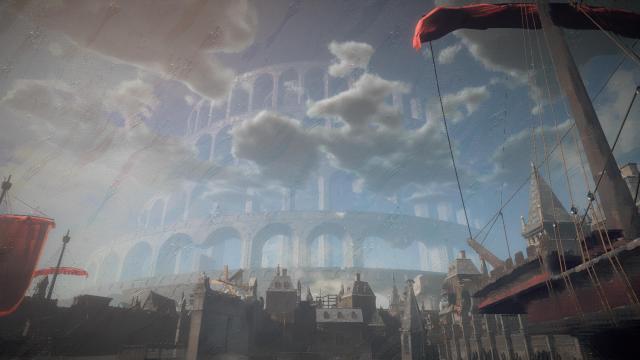
The other, and much more annoying, element is that two of the three attack modes for your weapons are locked off until completion of the campaign, which is about as mind bogglingly dumb a decision as you can make. Attack modes basically function as a way to determine how your weapons work in combat. Speed mode makes weapons move faster, power makes them hit harder, and technical gives them a wider variety of commands. You start off only being allowed access to speed mode, which is probably the least enjoyable of the three and makes the first 15 hours of the game an absolute slog. Perhaps this was done due to some misguided fear about overwhelming the player with complexity, but I’d much rather have too much to experiment with than too little.
Of course, actually getting to this point comes with challenges of its own due to the waning playerbase. Perhaps it’s not fair to criticize a game for not having players, but it’s something that has to be mentioned for an online focused released. The active playerbase is already incredibly small, and what’s still around is deep enough into the title that you should be prepared to play through a lot of the earlier chapters by yourself, which hurts the fun factor even more. I can’t state this definitively, since the game doesn’t say and I can’t find anything online that clarifies, but I don’t believe enemies scale at all depending on party size. If it does, it’s not very noticeable. Which means if you go into a mission by yourself, be prepared for some really tanky opposition. Enemies will rarely ever be a serious threat, as the damage they do is pretty minimal in the campaign, but they take so long to kill you may just die of boredom before you get to the end.
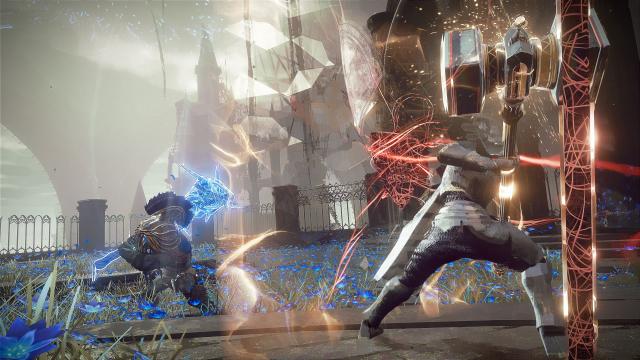
We haven’t even touched upon the microtransaction element of things, and if this review has convinced you how much you need to go out and buy this game right now, then you’ll be pleased to hear that you’ll have the chance to spend a bunch more money on in-game currency. I got through the campaign just fine without them regardless, but it’s always galling to me when a title that sells itself for full price has microtransactions to boot. Maybe there’s one in there that magically makes the Babylon’s Fall more fun; I wouldn’t know.
What I do know is that the game's budget certainly wasn't spent on the graphics, because its aesthetic is somehow uglier than its Metacritic score. It looks like someone threw up on a Renaissance painting and then compressed it down to 480p. Normally I wouldn’t care too much about graphics as long as the game itself was entertaining or fun in some way, but this isn’t for the most part, so I cannot possibly imagine what the development money went into, unless this was all just one big undercover operation to funnel money into marketing more shitty NFTs for Square Enix’s board to sell.
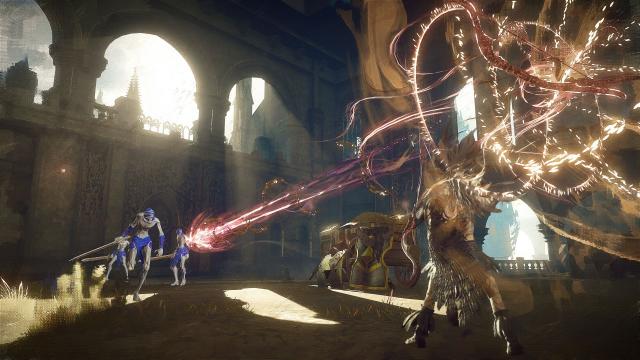
For what it’s worth, Babylon’s Fall is not the worst AAA game to ever release. It’s nowhere near something like Aliens: Colonial Marines or Ride to Hell in terms of awfulness. It runs properly, doesn’t have any major glitches, and is functional without having to spend any extra cash. It’s just a very boring, uninteresting game that doesn’t work or engage without such a substantial time commitment that I don’t think it would be worthwhile to even the most diehard of Platinum Games’ fans. And maybe “boring” is an even bigger condemnation than being downright awful. I’ve never thought of any Platinum title as boring before, but I suppose this is what we’ve been reduced to. All we need is for Michael Patcher to predict something correctly and all of the signs of the end time will be here.









